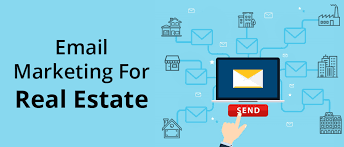Despite the presence of new technologies, email marketing is still a very powerful tool for real estate professionals that they can use to nurture leads, promote their brand and increase client engagement. By integrating an email template generator during the first phase of your campaign strategy, you can effectively simplify your communication process while maintaining consistency and efficiency. This guidance provides the key strategies and tips grouped under five main headings, which you can use to launch email campaigns that are particularly relevant to the real estate sector.
- Discovering the Fundamentals of Real Estate Email Marketing
Email Marketing Defined
Real estate email marketing is the strategic process of sending emails to a targeted group of a contact list that comprises of current, past and/or potential clients. The basis of this strategy lies in building long-term, fruitful relationships and growing client loyalty using targeted, timely content. The emails can be new listings, market updates, newsletters, and personal communications created specifically to keep your realtor always at the forefront of clients’ minds.
Why It Is Important for Real Estate?
Email marketing for real estate is a key tool. It offers the means for the direct and personal type of communication with the audience that shows engagement necessary for lead nurturing and conversion. With steady and purposeful email campaigns, realtors can nurture a continuing relationship with their customers, creating both a sense of familiarity and trust which are top in the real estate sector. Furthermore, this approach is budget-friendly and would allow brokers to reach many individuals in one go without a huge financial commitment. Another facet of email marketing that stands out is that it can be measured tangibly, as realtors can track open rates, click rates, and conversions knowing what works and being able to act accordingly. The possibility to check the success in real time and make the necessary adjustments if needed makes email marketing a powerful aid in a realtor’s promotional toolbox.
- Crafting Your Email Marketing Plan
Setting Objectives
First of all, set specific and measurable targets. Do you want to increase showings, make new listings known, or perhaps enhance the loyalty of your clients? Your goals will determine the content of your letters and the architecture of your campaigns.
Segmenting Your Audience
Efficient email outreach is focused. Group your email list by type of client (buyers, sellers), location, or where they are during the sales process. Personalization results in higher engagement rates.
- Developing Impactful Content
Content that Connects
Developing content that elicits a response from your audience is pivotal. Include in your real estate email marketing ideas like market trends, success stories, and useful guides. The notion of adding value should guide your communication efforts, whether you are speaking to experienced investors or first home buyers.
– Educational Content: Market analysis, buying tips, investment strategies.
– Updates and Announcements: New listings, company news, community real estate events.
– Engagement Drives: Questionnaires, competitions, feedback forms.
Visual Appeal
In real estate email campaign, the visuals are paramount. High-quality subject photos for listings, charts and graphs explaining the data as well as professional branding will make your emails stand out.
- Scheduling and Frequency of Emails
Best Practices for Scheduling
Scheduling is pivotal in the success of your email campaign.
- Test Different Times: Utilize A/B testing to know when your audience is likely to open and interact with your emails.
- Consistency is Key: Through the consistent sending of emails, your audience will remain interested and at the back of their minds.
- Avoid Over-Sending: A massive number of emails can cause users to unsubscribe. Strike a balance so as to neither bore nor overwhelm the audience while informing them.
- Analyzing and Optimizing Your Campaign
Measuring Success
Utilize analytics to monitor opens, clicks, and conversions from your emails. Through this data, you will realize what works and what doesn’t.
Optimization Over Time
Continue to refine your strategy with feedback and analytics. Try various subject lines, email structures, and calls to action to get an idea of what works best.
Technological Tools
Take advantage of CRM software and analytics platforms for automating processes and for deeper insights into your campaigns’ performance.
Conclusion
Email marketing real estate is not just about emails, it is about building relationships that grow your business. With the proper strategy, you can take advantage of email campaigns to communicate effectively, demonstrate your knowledge and create closer bonds with customers. Applying these structured approaches and tracking your performance with analytics, your email marketing will not only meet but exceed your expectations, leading to greater sales and enhanced customer satisfaction.






